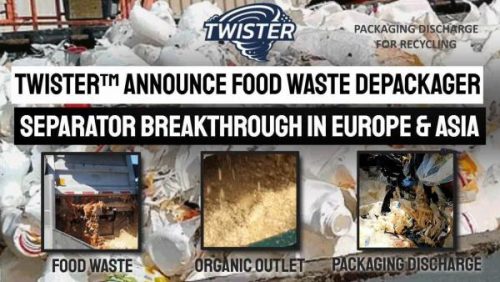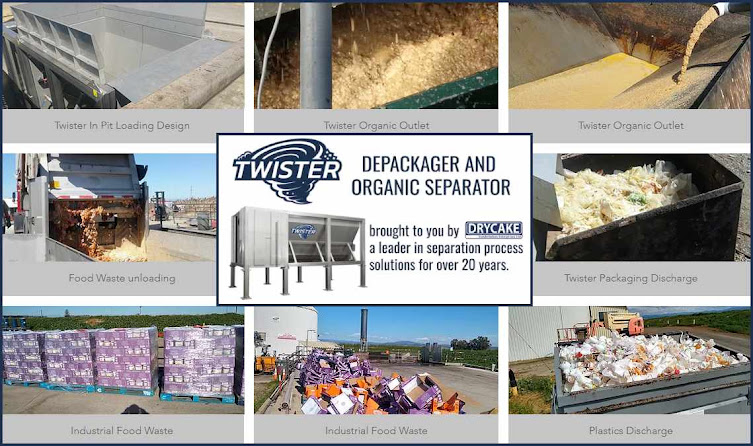When compared to competitors, the Twister Food Waste Depackager and Separator is breaking into new markets thanks to its low microplastics output and low energy consumption.
Twister announced today that their innovative Food
Waste Depackager and Separator has been purchased by new customers in Europe
and Asia. In the increasing EU and Asian markets, the small-footprint,
low-energy-use plastic waste reprocessing facility has established itself.
Since 2016, it has been in the works. It's a
decentralised organic processing system with exceptional separation performance
that was recently introduced in Canada.
Each opened, empty, and full box is ejected. The
"Twister" effect produces clean food waste that is free of
microplastics and suitable for anaerobic digestion.
"We wanted something distinctive for Drycake's
Twister," explains Mark Vanderbeken, Chairman and Founder of Drycake®.
"Anyone familiar with the food waste
depackaging industry will have noticed that everyone else looks to start their
depackaging and separation of source-separated organics by reducing particle
size." This is how most competing depackagers avoid congestion. They mill,
macerate, cut, or shred the plastic to make it into little pieces. Larger
pieces, on the other hand, are easier to separate than tiny ones, so why not
combine the depackaging and separation processes?"
Food Waste
Depackager Separator from Twister (TM)
So DryCake went back to the drawing board and came
up with a method that doesn't require any cutting and isn't dependant on reducing
particle size by processing plastic. In actuality, they use shear forces and
vibration to open and remove biological matter in a high-speed vortex, causing
as little injury as possible while making as little microplastics as possible.
As a result, it has established itself as a market
leader in terms of sustainability by reducing the risk of environmental damage
caused by plastic pollution. Due to rising evidence of "ocean microplastic
ingestion," which is hurting ocean plankton and the food chain that
sustains all marine life, Drycake adopted this course of action.
Slicing, bashing, and crushing these materials
likewise consumes a lot of energy. Hammer mills, blades, and knife openers all
have moving components that wear out and need to be replaced. As a result, the
Twister only has a few moving parts.
"It must be preferred to avoid breaking up
plastic wrapping wherever possible."
Mark continued, "Then you won't manufacture
those microplastic particles in the first place."
As a result, Drycake predicted that this invention
would be in high demand right away. This company has strong prospects to
disrupt the market and become the industry-standard depackager provider in
Europe and Asia, with considerable environmental benefits.
On the one hand, they want to provide their clients
the option of running sustainable plastic recycling businesses, reprocessing
garbage into resin for use in new packaging as part of the "circular
economy," which is vital to averting runaway climate change. While also
providing biogas facilities with a high-quality organic paste.
They may offer this mixture, or "organic
soup," as feedstock to anaerobic digestion plant operators, allowing them
to create renewable energy in the form of biogas refined to biomethane.
Renewable Natural Gas (RNG) is compressed biomethane that may be injected into
town and city gas mains to heat our homes.
It's also ideal for use as a low-emission
transportation fuel throughout the transition to hydrogen technology.
Twister is also a novel concept, as its target
market is larger than city/regional MRFs and ERFs (Energy Recovery Facilities/
Incinerators). The small size is ideal for several locations around a city,
reducing RCV travel distances, lowering collecting costs and emissions, and
improving food waste collection efficiency.
Waste collection employees will spend more time on
the street collecting rubbish and less time sat in the cabs of their RCVs en
route to the MRF ERF or transfer station as a result of the Twister unit
distribution. Drycake will also design the entire process, as well as the
facility, if necessary.
Twister's low energy use, low carbon footprint,
simple maintenance, and high uptime are all features they wish to impress their
clients with. It's a sound long-term investment that's also environmentally
friendly.
In fact, supermarkets, organisations, and
institutions that run catering facilities, as well as clients in the food and
beverage industry, may discover that purchasing just one Twister unit will help
them achieve their sustainability goals. As a consequence, their company's
carbon footprint is reduced, and they may proudly showcase their really green
achievements for years to come.
It's always a risk to try anything new, but they
feel it's one worth taking. In this circumstance, not least to contribute to
the global environment's preservation and to develop a product that would help
in the attainment of Net-Zero Carbon 2050 emission targets.
How Twister, a vortex-based food waste depackager, Outperforms Rivals
Twister Food Waste Depackager technology
accomplishes this in four different ways:
1. Combining two operations into a single unit to
save energy and water.
2. Reducing dependency on fossil fuels (e.g., oil),
which produce much more "greenhouse gas" carbon when things are made
from virgin plastic resins instead of recycled.
3. By transforming food waste into a plastic-free
paste or slurry that may be used to power a biogas plant, which provides
sustainable energy while emitting very little net carbon dioxide. This
eliminates the need to develop oil or gas geological deposits once more.
4. When organic slurry is digested and applied to
agricultural land, it decreases carbon emissions by reducing the requirement
for chemical fertilisers on the part of the farmer. Traditional fertilisers are
derived from geological deposits. They need a lot of fossil fuel to extract and
transport them, therefore this notion contributes even more to environmental
preservation.
Conclusion on the Twister Food Waste Depackager
Drycake has been a global leader in separation
solutions since 1995. Since its founding, it has provided market-disrupting
process equipment and design for sustainable waste reuse, recycling, and energy
recovery on a global scale.
This isn't the first time Drycake has gone against
the grain. They previously made a splash with the Plastifloat, a waste reuse
and materials recovery system for municipal and industrial wastewater. A
straightforward yet effective method for extracting plastic from liquids.
Drycake has grown into Europe and Asia, in addition
to previous sales in the Americas, and the Twister Food Waste Depackager is
aiming for global recognition. More information may be found in the following
article: Vortex Depackager and Separator by
Twister
Visit https://www.twisterseparator.com for more
details.
Also see https://drycake.com for more information.


